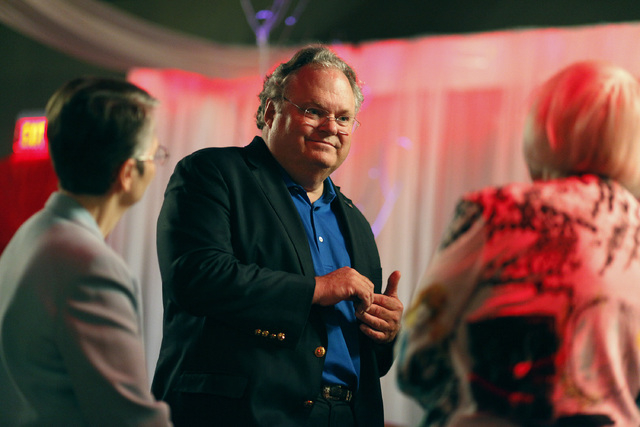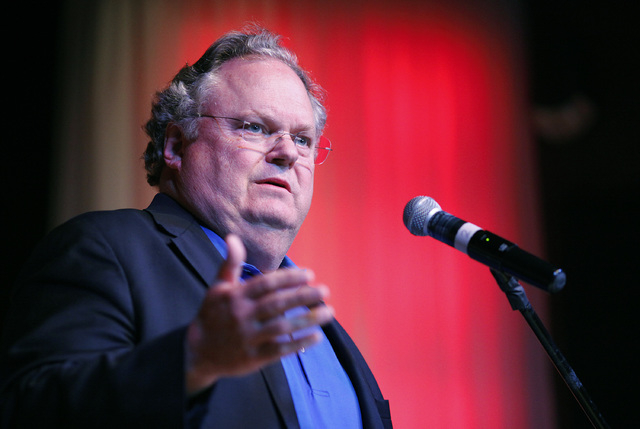Texas lawmaker cautions against business margins tax in Nevada
A Texas senator Tuesday warned Nevadans not to approve a proposed 2 percent margins tax on businesses, saying it could hurt mid-size companies and efforts to lure new firms to the state.
The proposed Nevada tax, known as the Education Initiative on the Nov. 4 ballot because an estimated $700 million in annual revenue would go to improve schools, was modeled after Texas’ franchise tax.
State Sen. Craig Estes said he voted for the revamped Texas franchise tax in 2006 but last year tried to repeal it. He said the levy has punished mid-size companies and likely has slowed the state’s efforts to attract new companies or help existing businesses expand.
“Some of these mom-and-pop, medium-sized companies saw their taxes go up fourfold,” Estes said in an interview, adding that a new study suggests Texas’ economy could take off even more if the state eliminates the franchise tax.
“The overall benefits of the tax are a lot less than we thought,” he said. “Without it, we could energize the economy.”
Estes was invited by the Nevada Policy Research Institute, a conservative/libertarian think tank, to talk about the margins tax Tuesday in Las Vegas and Wednesday in Reno. He spoke to about 70 people at the Bootlegger Bistro on Tuesday.
The margins tax, Question 3 on the ballot, was proposed by the Nevada State Education Association after the teachers’ union became frustrated with the Nevada Legislature and GOP Gov. Brian Sandoval for not adding funding to education to improve the state’s last-in-the-nation status.
Proponents argue the tax would only hit 13 percent of Nevada businesses, which now pay no income tax. The mining industry, however, pays a tax, as does gaming, which is taxed on gross receipts.
Estes said Texas’ franchise tax is 1 percent on most companies that make at least $1 million in annual revenue and 0.5 percent on wholesalers. He said it wasn’t a new tax for Texas but a revised version because businesses didn’t have to pay the original levy if they were incorporated in another state. Texas limited liability corporations also were not taxed.
“It was like a voluntary tax,” Estes said.
While revising the franchise tax, Texas lowered its property tax rate from $1.50 to $1 per $100 of appraised value, Estes said.
Estes said the tax shift did little to lower the tax burden because home values appreciated. A potential property tax savings of $4,000 a year for him, for example, became a $400 savings.
Meanwhile, franchise tax collections fell short of expectations — $3.9 billion, not the estimated $6 billion.
Nevada’s proposed margins tax — the first such broad business tax — would be 2 percent on all businesses making more than $1 million in annual revenue, whether or not the company is profitable.
“Your situation is, ‘Let’s create a brand-new tax,’ ” Estes said, wondering why Nevadans see it as necessary. “I’m telling you, using us as a model is not the way to go. I’ve kind of seen the light, so to speak.”
Dan Hart, a spokesman for the Education Initiative, said Texas is thriving.
“If it’s done so much damage to Texas, why is their job growth so high and their economy booming?” Hart asked. “You have to look at Texas as one of the best economic engines the country has.”
Estes, a Republican, is fighting an uphill battle to rid Texas of the franchise tax. He introduced legislation in 2013, but it never got a hearing. Like Nevada, Texas holds its legislative sessions every two years.
Estes said big corporations such as Wal-Mart and Exxon don’t mind the franchise tax, and small businesses with little revenue aren’t affected. But he said the tax is hurting a big economic driver in the state by targeting medium-sized businesses that often are just making ends meet.
“The tax didn’t work out as intended,” Estes said. Estes argued that Nevada could look for another solution to funding education instead of creating what would be one of the biggest corporate tax rates in the nation.
In Texas, Estes said the state doesn’t need the revenue from the franchise tax because of new oil development using fracking technology. He said the state’s rainy day fund holds about $9 billion and is being tapped for other uses
“Every state is different, but we could totally eliminate it,” Estes said. “I had a real ‘a-ha’ moment. Why do we even need this tax?”
Asked by an audience member what effect he thinks the margins tax would have on Nevada, Estes said: “I think it would have a chilling effect on the businesses you’re trying to pull into the state. We have been a success despite the margins tax.”
Estes said another drawback to the margins tax is that businesses usually pass it on to people, so the price of goods and services will rise.
“Businesses don’t really pay any taxes,” he said. “If they’re profitable at all, it’s always passed along to the consumer.”
Contact Laura Myers at lmyers@reviewjournal.com or 702-387-2919. Find her on Twitter: @lmyerslvrj.


















